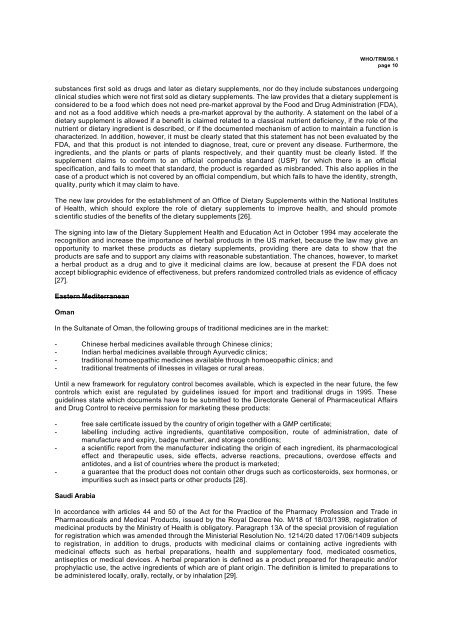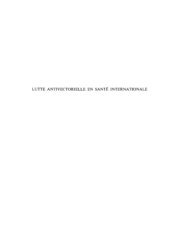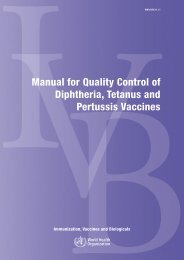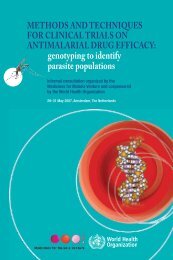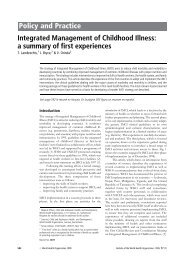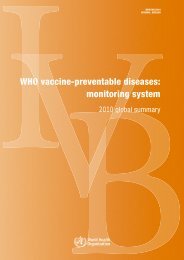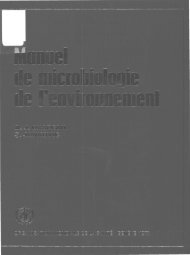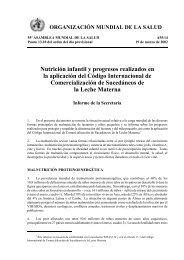WHO/TRM/98.1page 10substances first sold as drugs and later as dietary supplements, nor do they include substances undergoingclinical studies which were not first sold as dietary supplements. The law provides that a dietary supplement isconsidered to be a food which does not need pre-market approval by the Food and Drug Administration (FDA),and not as a food additive which needs a pre-market approval by the authority. A statement on the label <strong>of</strong> adietary supplement is allowed if a benefit is claimed related to a classical nutrient deficiency, if the role <strong>of</strong> thenutrient or dietary ingredient is described, or if the documented mechanism <strong>of</strong> action to maintain a function ischaracterized. In addition, however, it must be clearly stated that this statement has not been evaluated by theFDA, and that this product is not intended to diagnose, treat, cure or prevent any disease. Furthermore, theingredients, and the plants or parts <strong>of</strong> plants respectively, and their quantity must be clearly listed. If thesupplement claims to conform to an <strong>of</strong>ficial compendia standard (USP) for which there is an <strong>of</strong>ficialspecification, and fails to meet that standard, the product is regarded as misbranded. This also applies in thecase <strong>of</strong> a product which is not covered by an <strong>of</strong>ficial compendium, but which fails to have the identity, strength,quality, purity which it may claim to have.The new law provides for the establishment <strong>of</strong> an Office <strong>of</strong> Dietary Supplements within the National Institutes<strong>of</strong> Health, which should explore the role <strong>of</strong> dietary supplements to improve health, and should promotescientific studies <strong>of</strong> the benefits <strong>of</strong> the dietary supplements [26].The signing into law <strong>of</strong> the Dietary Supplement Health and Education Act in October 1994 may accelerate therecognition and increase the importance <strong>of</strong> herbal products in the US market, because the law may give anopportunity to market these products as dietary supplements, providing there are data to show that theproducts are safe and to support any claims with reasonable substantiation. The chances, however, to marketa herbal product as a drug and to give it medicinal claims are low, because at present the FDA does notaccept bibliographic evidence <strong>of</strong> effectiveness, but prefers randomized controlled trials as evidence <strong>of</strong> efficacy[27].Eastern MediterraneanOmanIn the Sultanate <strong>of</strong> Oman, the following groups <strong>of</strong> traditional medicines are in the market:- Chinese herbal medicines available through Chinese clinics;- Indian herbal medicines available through Ayurvedic clinics;- traditional homoeopathic medicines available through homoeopathic clinics; and- traditional treatments <strong>of</strong> illnesses in villages or rural areas.Until a new framework for regulatory control becomes available, which is expected in the near future, the fewcontrols which exist are regulated by guidelines issued for import and traditional drugs in 1995. Theseguidelines state which documents have to be submitted to the Directorate General <strong>of</strong> Pharmaceutical Affairsand Drug Control to receive permission for marketing these products:- free sale certificate issued by the country <strong>of</strong> origin together with a GMP certificate;- labelling including active ingredients, quantitative composition, route <strong>of</strong> administration, date <strong>of</strong>manufacture and expiry, badge number, and storage conditions;- a scientific report from the manufacturer indicating the origin <strong>of</strong> each ingredient, its pharmacologicaleffect and therapeutic uses, side effects, adverse reactions, precautions, overdose effects andantidotes, and a list <strong>of</strong> countries where the product is marketed;- a guarantee that the product does not contain other drugs such as corticosteroids, sex hormones, orimpurities such as insect parts or other products [28].Saudi ArabiaIn accordance with articles 44 and 50 <strong>of</strong> the Act for the Practice <strong>of</strong> the Pharmacy Pr<strong>of</strong>ession and Trade inPharmaceuticals and Medical Products, issued by the Royal Decree No. M/18 <strong>of</strong> 18/03/1398, registration <strong>of</strong>medicinal products by the Ministry <strong>of</strong> Health is obligatory. Paragraph 13A <strong>of</strong> the special provision <strong>of</strong> regulationfor registration which was amended through the Ministerial Resolution No. 1214/20 dated 17/06/1409 subjectsto registration, in addition to drugs, products with medicinal claims or containing active ingredients withmedicinal effects such as herbal preparations, health and supplementary food, medicated cosmetics,antiseptics or medical devices. A herbal preparation is defined as a product prepared for therapeutic and/orprophylactic use, the active ingredients <strong>of</strong> which are <strong>of</strong> plant origin. The definition is limited to preparations tobe administered locally, orally, rectally, or by inhalation [29].
WHO/TRM/98.1page 11In accordance with the "Regulations for Registration <strong>of</strong> <strong>Herbal</strong> Preparations, Health and Supplementary Food,Cosmetics and Antiseptics that have Medicinal Claims" issued by the Ministry <strong>of</strong> Health <strong>of</strong> the Kingdom <strong>of</strong>Saudi Arabia, the formal application for registration which is submitted to the General Directorate <strong>of</strong> Medicinaland Pharmaceutical Licences at the Ministry <strong>of</strong> Health is based on the registration <strong>of</strong> the product in the country<strong>of</strong> origin. For this reason, documents such as manufacturing licences, free sales certificates, and GMPcertificates have to be submitted with information on composition, therapeutic category, certificate <strong>of</strong> analysis,percentage <strong>of</strong> alcohol and, in the case <strong>of</strong> ingredients <strong>of</strong> animal origin, the kind <strong>of</strong> animal. Furthermore, fullspecifications and methods <strong>of</strong> analysis <strong>of</strong> the finished product, data on stability studies and storageconditions, six samples <strong>of</strong> the product and <strong>of</strong> the outer package and label, together with abstracts <strong>of</strong> scientificreferences testifying to the efficacy and safety <strong>of</strong> the product have to be submitted [47]. Handling <strong>of</strong> locallyproduced or imported products is prohibited before registration by the Ministry <strong>of</strong> Health. After registration it isnot allowed to make any change in the composition, specification, method <strong>of</strong> manufacturing, indications,container or package unless it has been approved by the authority. A registration may be cancelled by theauthorities under certain pre-conditions. The registration committee reviews registered products after threeyears from the date <strong>of</strong> registration, or as deemed necessary, to consider the need for re-registration [29].EuropeGeneral aspectsThe European Community has developed a comprehensive legislative network to facilitate the free movement<strong>of</strong> goods, capital, services and persons in the Community. According to Directives 65/65/EEC [30] and75/318/EEC [31], pharmaceutical products require pre-marketing approval before gaining access to themarket. Requirements for the documentation <strong>of</strong> quality, safety, and efficacy, the dossier and expert reports arelaid down in Directive 91/507/EEC [32]. Article 39 para 2 <strong>of</strong> Directive 75/319/EEC [33] obliged Member States tocheck all products on the market at that time, with a deadline <strong>of</strong> 12 years, to determine whether they met therequirements <strong>of</strong> these directives. Countries have taken different approaches in reviewing phytomedicines.Attempts to Meet the Need for HarmonizationTo achieve free movement <strong>of</strong> medicines within the common market <strong>of</strong> the European Union, and a centralizedsystem <strong>of</strong> marketing authorization (e.g., for new chemical entities) with the possibility <strong>of</strong> application at nationallevel only, a system <strong>of</strong> mutual recognition <strong>of</strong> marketing authorization decisions has been installed [34]. This"decentralized procedure" provides, as a general rule, that an assessment by one national authority should besufficient for subsequent registration in other Member States. Under this procedure, the so-called "Summary <strong>of</strong>product characteristics (SPC)" approved by the first authority must be taken into account. If differences inevaluation occur between national authorities, a decision will be reached by an EC procedure. In accordancewith the new EC Directive, this decision is binding from the beginning <strong>of</strong> 1995, and may - in case <strong>of</strong> a negativeresult - have a negative rebound effect on the first registration in an EC Member State, this registration beingannulled if the applicant does not withdraw the application for recognition <strong>of</strong> the dossier. As uniform criteria ata European level regarding the assessment <strong>of</strong> safety and efficacy do not exist, there is only a guideline forquality <strong>of</strong> herbal remedies [35]. The harmonization <strong>of</strong> scientific assessment is considered a precondition foradjustment <strong>of</strong> different marketing authorization decisions, particularly in the field <strong>of</strong> phytomedicines in whichthere are different national viewpoints and traditions.The European Scientific Cooperative on Phytotherapy (ESCOP) was founded in 1989, the main objectivesbeing to establish harmonized criteria for the assessment <strong>of</strong> phytomedicines, to support scientific researchand to contribute to the acceptance <strong>of</strong> phytotherapy at a European level [36]. In October 1990, the first fivemonographs were presented at a symposium in Brussels and were <strong>of</strong>ficially handed over to representatives <strong>of</strong>the European Community. After a thorough assessment, the Committee on Proprietary Medicinal Products(CPMP) published four monographs on anthraquinone laxatives in May 1994 [37], but no decision was madein case <strong>of</strong> Matricariae flos and Valerianae radix. Although this was disappointing for ESCOP, it was decided tocontinue preparing harmonized SPC proposals so as to fulfil an obligation to the European Union for 50monographs by end <strong>of</strong> December 1996. Criteria for the selection <strong>of</strong> medicinal plants and the preparation <strong>of</strong>draft SPCs by the Scientific Committee are mainly their importance in European countries and their inclusionin the European Pharmacopoeia or a national pharmacopoeia. The draft is then discussed thoroughly by theScientific Committee, sometimes with external experts from universities or companies. When a harmonizeddraft is regarded as finalized by the Scientific Committee, it is circulated to an independent Board <strong>of</strong>Supervising Editors. Members <strong>of</strong> this Board are scientists and teachers from European universities, mainlyactive in the field <strong>of</strong> pharmacognosy and pharmacology [38].


